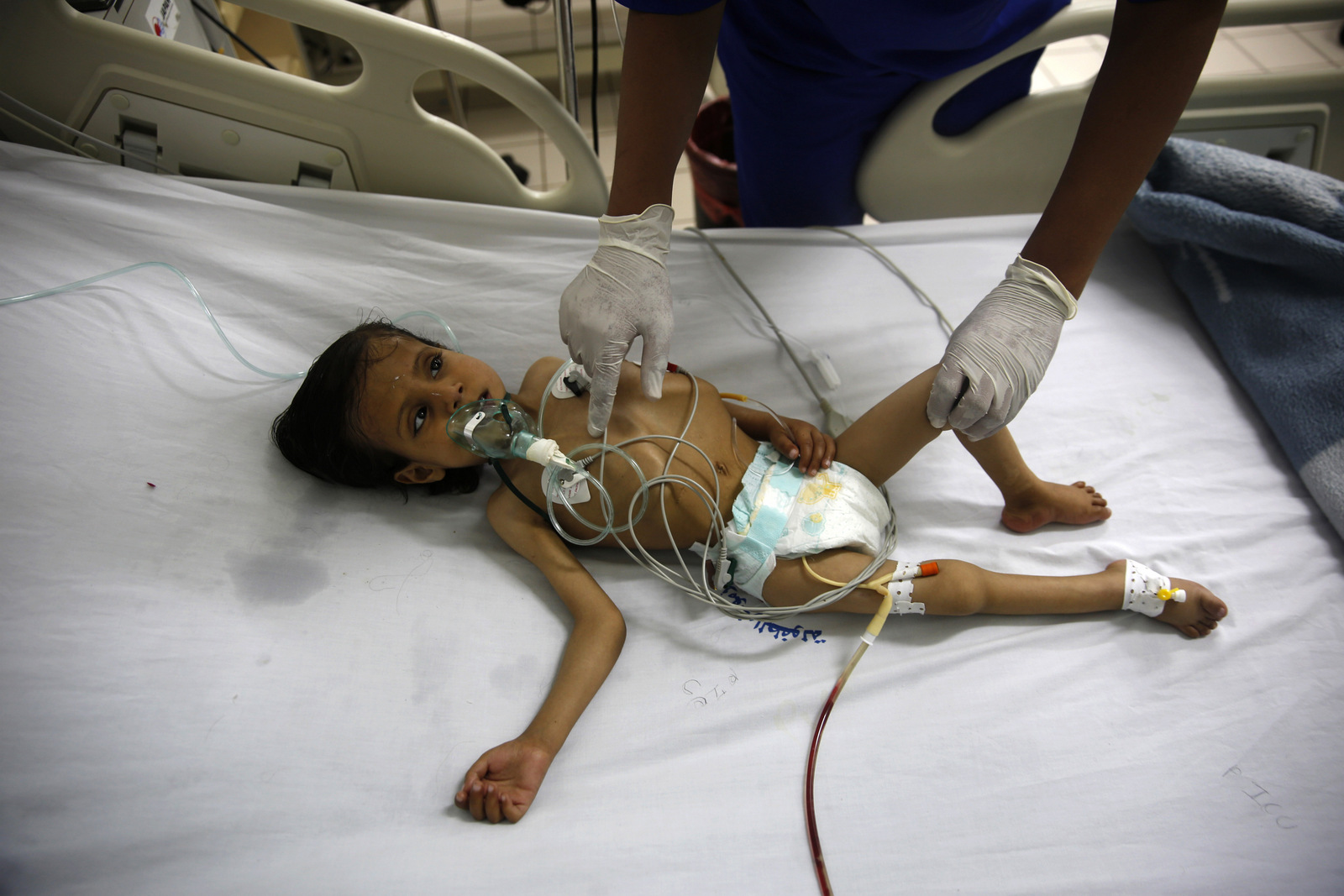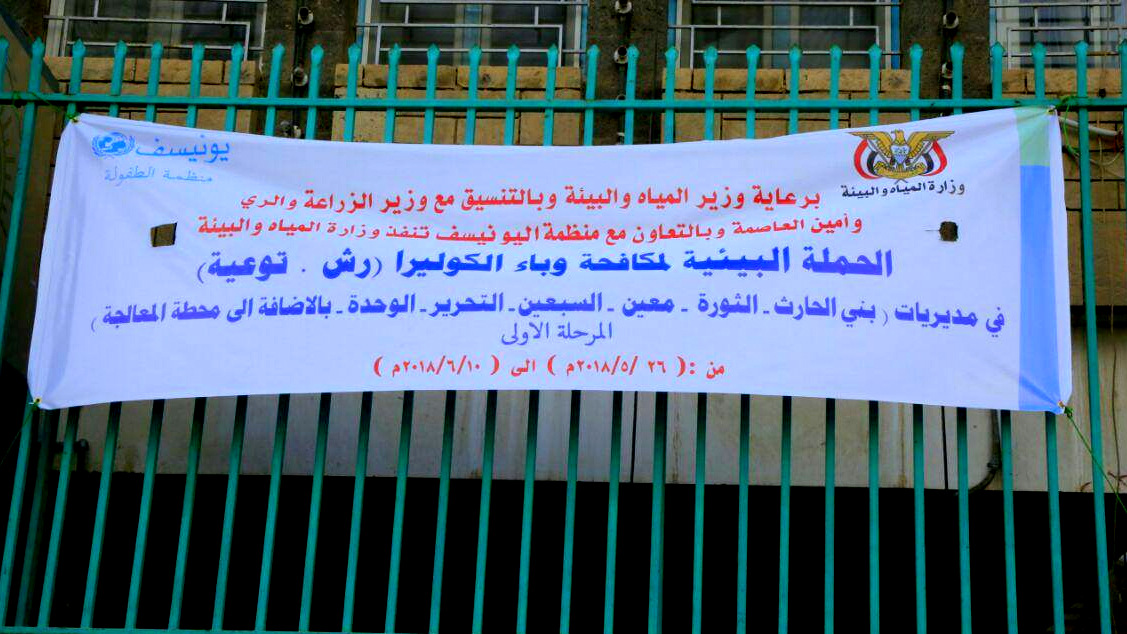SANA’A, YEMEN — When his wife’s vomiting and diarrhea simply wouldn’t stop, 40-year-old Ali Sherwaid, an English teacher, did a quick accounting in his head, calibrating the catastrophe that had befallen him. With cholera ravaging his wife, 28 years-old and nine-months pregnant with the couple’s first child, Sherwaid needed to get her medical treatment. Problem was, the constant Saudi airstrikes had decimated the healthcare infrastructure in Yemen’s northern Sa’ada province, and his village of Fudh was at least 6 hours drive, on bad country roads, to the nearest hospital.
Compounding the crisis was the fact that Sherwaid had no money — Yemen’s civil servants haven’t been paid in months — and he had nothing to pay a doctor to treat his wife, Fatimah.
And so Sherwaid auctioned off his wife’s jewelry, borrowed money from neighbors, bundled his wife’s doubled-over frame into his car, and sped off in the night, headed for al Jomuri Hospital in the city of Sa’ada, some 80 miles away. Days later, as her health continued to break down, his wife was taken to Al Sabeen Hospital in Sana’a, the capital.
In an interview, Sherwaid told MintPress News:
When we finally reached the hospital, my wife was inching towards death.”
What is taking shape across this Texas-sized nation at the southern tip of the Arabian peninsula is an awful, perfect storm, a disastrous collaboration between nature and man that has caused a cataclysm, unlike anything the world has ever seen.
Yemen’s is the 21st century’s worst humanitarian crisis and, when measured by the proportion of the population affected, it might well be the worst in a century. Since the armed conflict erupted in March of 2015, more than 10,000 Yemenis have died, and 22.2 million people — out of a total population of just under 28 million — are now in need of food, medicine, water and shelter. Of that number, 11.3 million — mostly women, children, and the elderly — are at risk of dying, according to international relief agencies.

A nurse cares for a malnourished boy at Al-Sabeen hospital in Sanaa, Yemen. Hani Mohammed | AP
In addition to an aggressive bombing campaign led by Saudi Arabia and the United Arab Emirates, and supported by the United States and the United Kingdom — targeting Yemen’s civilian infrastructure, including hospitals and clinics — the coalition’s blockade of Yemen’s land, sea and air routes has left more than 12 million people without wheat and other food staples. The combination of the blockade and bombing of Yemen’s electrical grid has left nearly 15 million Yemenis without access to health care, and 10 million are in jeopardy of losing access to potable water.
The shortage of potable water has driven Yemenis to drink from water sources polluted with their neighbors’ feces and urine, resulting in a cholera outbreak that is believed to have infected more people than any cholera epidemic in modern history. Since the spring of 2011,”nearly 1,490,000 cases of a particularly aggressive strain of the waterborne disease have been reported in Yemen,” Abdul Hakeem al-Kuhlani, general manager of the cholera observation unit in Sana’a said to a Journalist for MintPress; “tens of thousands have proven fatal.”
Even before the war, Yemen was the poorest country in the Middle East. The war has deepened poverty; millions of public-sector employees have gone months without a paycheck.
“Everything in Sa`ada has been destroyed by Saudi airstrikes,” Sherwaid told MintPress. “My wife, who is pregnant with our first child, contracted cholera; I didn’t have money and was forced to sell everything to save my wife and child.”
The room of horrors
The cholera ward at Al Sabeen Hospital is a room of horrors. A dozen patients lie motionless in their beds; a couple watches their child take his last breath. A man vomits into a pan, his eyes dry and dazed. Patients’ families kneel in prayer to Allah. When Sherwaid arrived at the camp, the families welcomed him and helped his wife find a new bed. Saeed — a father of two children, ages six and nine, who are infected with cholera — whispers to Sherwaid: “I only want to see my two sons recover from cholera, and then we can celebrate.” He tells MintPress, “My youngest son Salem, six, was first infected, and then he transmitted the disease to his brother.”
“We expect to see a surge of cases during the rainy season,” Anton Camacho, lead author of a study on the epidemic published in The Lancet Global Health journal, told Reuters.

MSF`s cholera treatment center in Hajjah’s Abs, destroyed by Saudi airstrikes on June 11, 2018. Ahmed Abdulkareem | MintPress News
The Saudi-led coalition targeted this particular center for the second time, and facilities managed by Doctors Without Borders have been targeted on six different occasions. According to a statement by the Ministry of Public Health and Population in Sana`a: “The U.S.-Saudi-led coalition deliberately undermines the health system,” in Yemen, and the “United States of America bears responsibility for these attacks.”
The Yemen War is spiraling out of control. The Saudi/UAE/U.S. coalition bombed a Doctors Without Borders cholera treatment facility earlier today.
Let me repeat that – the U.S helped bomb A DOCTORS WITHOUT BORDERS CHOLERA TREATMENT FACILITY.
— Chris Murphy (@ChrisMurphyCT) June 11, 2018
After attack on Hodeida, the humanitarian situation worsens
The Saudi-led coalition escalated its airstrikes on the city of Hodeida in western Yemen, which is the lone remaining supply line for the millions of Yemenis in the north who rely on foreign aid for food, fuel, medicine for cholera, and other necessities. The number of Yemenis in danger of starving to death could rise from 8.4 million currently to 18.4 million by December of this year, according to UN officials.
On May 6, 2018, national health authorities launched an oral cholera vaccination (OCV) campaign in cooperation with the World Health Organization and UNICEF. Almost 275,000 doses of OCV were administered in May across five priority districts in Aden, reaching nearly 70 percent of the target population.

A billboard raising awareness of the environmental campaign against cholera in the Tahrir district of Sanaa, June 11, 2018. Ahmed Abdulkareem | MintPress News
For his part, Sherwaid gets a double-dose of horrible news: His unborn child died and his wife has an incurable kidney disease and will need dialysis for the rest of her life. Realizing it could be worse, Sherwaid says almost jubilantly: “Praise Allah.”
Top Photo | A man is treated for suspected cholera infection at a hospital in Sanaa, Yemen. Hani Mohammed | AP
Ahmed AbdulKareem is a Yemeni journalist. He covers the war in Yemen for MintPress News as well as local Yemeni media.
The post In Yemen, Selling, Borrowing, Begging To Save Loved-Ones as Cholera Rages appeared first on MintPress News.
